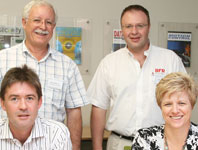

Hi-Tech Security Solutions asks what we can expect in 2011.
One of the end-of-year habits we at Hi-Tech Security Solutions have developed is to hold a round-table discussion with people in the industry to determine what the market expects from the coming year. Last year was no different and we were joined by Linda Glieman from Ideco Biometric Security Solutions, Walter Rautenbach from neaMetrics/Suprema, consultant Rob Anderson and Bruno Jones from BFR Digital to discuss what 2011 holds.
Coming out of a strained year which saw almost two months given up to the Soccer World Cup and an otherwise slow economy, although those in the know claim South Africa only felt a small part of the recession, the big question must be whether 2011 is going to be a year of spending or a year of caution when it comes to money.
Rautenbach reflects that traditionally companies in the country see things slow down towards the end of the year in preparation for a very relaxed December, but 2010 was different. “If business in 2011 is going to be anything like the last few months of 2010 then it is going to be booming next year and we are really looking forward to that.”

However, he is not prepared to bet on a boom, saying the economy is unpredictable now with the increased cost of living and wage demands not reflecting the economic downturn. The strong rand is working in importers’ favour right now, but how long will this last?
Glieman is more cautious, noting that 2010 started off “a bit slow and then started picking up in the middle of the year. However, I think there has definitely been an increase in acceptance and more of an awareness of biometrics in general. Ideco is going to spend a lot of time this year driving a better understanding of the use of biometrics and identity management, creating more insight into how the products can help companies.

“I think 2011 is going to be quite a positive year for the market, especially for the access control sector in terms of identity management, there was definitely an upturn towards the end of 2010. I understand a lot of projects were on hold because of the world cup and these are now ready to roll. We are going to spend time educating the end users and helping our partners define the return on investment (ROI) our solutions deliver.”
With his focus on KZN mostly, Anderson says his practice was swamped in the run-up to the world cup with related work, but he also saw other projects being put on the back burner until the soccer chaos was over.
“Since the Soccer World Cup we have had a big vacuum of very little happening. Many projects that were due to take off just have not because they cannot get funding, the banks have obviously tightened up. So in KZN we are seeing enormous potential but no money in the bank to get it going. On the positive side, in the Cape and Gauteng, for some reason, we see things starting to bubble.”
Anderson has also noticed that the client base is becoming more educated about what it is that fits into a good security solution. It’s been driven strongly by sales people who go and educate their client base, sometimes focused on a product set, of course, but often with good educational information.
He also sees a great need to focus on ROI, something the IT industry does well, but the security industry is only learning to do. “Security is a grudge purchase and we are going to have to become more innovative in explaining to the client what the return on their investment is.”

Jones says BFR is another company that started the year slowly, but then picked up quite rapidly. If 2011 continues as 2010 ended, he expects a good year ahead. However, he says realistically we need to be cautious as we may be in for rough times. “The US economy is not recovering like they thought it would and many companies in the UK are still feeling a lot of pain, so I think the road to recovery is going to be slow. And the increases in electricity and food costs are going to hit the consumer hard, especially in a country with such high unemployment.”

IP and all that
Given the marketing and hype around IP and how the universe is moving in this direction away from analogue, it is interesting to note that while the products distributed by neaMetrics are mainly used in IP implementations, Jones says BFR has seen a decrease in the call for IP-related products and an increase in the call for analogue solutions.
While this may seem contrary to the popular perception that IP is overtaking analogue, it is worth noting that analogue is far from dead. In another article in this issue Pelco agrees, also noting its analogue sales are still healthy.
It is also interesting to note that while high-definition (HD) IP cameras are being touted as the latest and greatest, the analogue market has come up with an analogue HD solution, which we can expect to see rolling out this year. If this technology delivers, we may see analogue hanging around for many more years.
Anderson adds, “I have been paddling in this pond for quite a few years and whenever a product enters a market it goes through that period to get to mature, so we are still in the maturity phase of the IP world.
“We are seeing a lot of guys that came into the IP market and messed it up and upset people who thought IP is the best, now they think it is the worst. Probably it was badly installed, used the wrong switches, or people did not understand that they were going to be moving large amounts of data. So, I do not think it is there yet.”
Jones notes that the move to IPv6 will boost the use of IP due to all the advances and benefits it brings. Additionally, when it comes to solutions, integrating surveillance with access control and so forth, this is where Rautenbach and businesses see the value of IP.

Educating user and industry
There is still a lot of education needed in the market according to Glieman, and she expects to see suppliers taking a more proactive role in educating their potential market over the coming years. Many people have disparate solutions and they have realised the value of integration. Sad to say, but it is mostly the larger companies out there who have the skills and experience, including IT skills, required to make integration projects work.
While the recession has seen many smaller companies, especially the so-called bakkie brigade going under, Rautenbach has seen many smaller companies improving their customer service radically to ensure they keep their clients and stay in business. These companies may not have the reach of their larger counterparts, but they ensure their service and skills in their areas of expertise is unbeatable.
This is where the discussion turns to an old favourite, standards. Anderson and Jones note that while there are many standards out there, they are not policed effectively and far too many installers simply do not know or care to follow them. There are also new entrants to the market who think installing an IP camera is simple and easy way to make money in a recession – perhaps we are seeing a new range of IT-literate bakkie brigaders in the making.
At the same time, probably as a result of the recession, most companies are inundated with people looking for courses and certifications, as well as installer or reseller agreements since the security market is supposedly recession-proof. Companies faced with these potential partners are in a bind since they obviously want new business, but they do not want to be left carrying the risk after a fly-by-night vanishes leaving a poor installation.
New kids on the block
It is common to have a continual flow of technologies and brands entering and leaving a market, but there is an expectation that IP will also open the doors to new brands making an appearance. Samsung was fairly unknown in the surveillance market, for example, but it seems to have made a dramatic entrance with quality products and reasonable pricing that are supposedly selling like hotcakes. Who else can we expect to see make an appearance with quality products?
No wireless coup
Another technology that gets more airtime than it probably warrants is wireless networking. While there are innumerable wireless networks being run in almost every company in the country, when it comes to security wireless is not always the answer. One reason for this is the inherent insecurity of wireless LANS, you do not have to actually be attached to a physical cable to gain access.
Rautenbach says there are always enquiries about wireless solutions, but people generally revert to the traditional wired solutions when they realise there is a premium to pay for wireless technology. Glieman agrees and says her wireless products are generally purchased for remote operations where there is no existing network and it would be too expensive to install cabling infrastructure.
Of course, wireless networking is starting to play an important role in the alarms and armed response market with some companies offering GSM alarms and CCTV channels. Although more expensive due to the cost of cellular data, many users see the benefits of having remote access to their own surveillance footage when an alarm is raised to determine if there is a problem and the scope of it. Naturally, the same benefits could be used by armed response companies to cut out false alarms.
The issue at stake here is how will wireless connections handle large amounts of video data when there are numerous subscribers and no quality of service guarantees? Mesh networks is a possible answer, but not one that has had much impact in South Africa – and here again the quality issue comes to the fore.
Despite the negatives, many smaller organisations and installers are taking the easy route and implementing wireless surveillance and integrated security solutions, seemingly successfully. It may be that a limited number of cameras on a standard WLAN connected to the Internet for remote access is just what the doctor ordered for the SMME market.
The year of integration?
Integration seems to be a topic often mentioned when talking of security solutions these days. And while Glieman and Rautenbach both see an increasing customer demand for integration between access and surveillance technologies, more companies are extending this to their logical access as well.
With IT playing such an important role in organisations, taking better care of who does what on corporate systems is a crucial aspect of security. It is not all that complex to set up a system that will not allow a user to log onto their desktop if they have not passed the physical access control system at the front door.
Anderson believes this will happen first in the large organisations that can afford integrated solutions and can afford to support and maintain them. Smaller companies are not high on the list when it comes to vendors producing affordable integrated solutions.
In addition, this year will see more companies opting to ditch their password access in favour of something more secure, such as biometrics or two-factor authentication.
In closing, Jones mentions that LED lighting is something to watch this year in the surveillance market. He says LED are becoming brighter, more energy efficient and cheaper all the time and will create opportunities for interesting solutions in the coming years. Anderson supports this noting that Moore’s Law also applies to LEDs. “We are seeing LED is doubling in output roughly every 18 months in the security industry’s own version of Moore’s Law, says Anderson, which makes this an interesting area to keep an eye on.”
When looking at the fragile state of the economy, both local and global, one has cause to be concerned as to what to expect this year. Add to that the lack of rationality shown in South African political circles, the potential of mounting additional taxes to be paid and there is good reason to be cautious. On the positive side, things were looking more positive at the end of last year and with South Africa being invited into the BRIC gang the country may get a needed boost to its economy and to the security industry as well. If you have any opinions on the potential for 2011, feel free to e-mail your thoughts to [email protected].
| Tel: | +27 11 543 5800 |
| Email: | [email protected] |
| www: | www.technews.co.za |
| Articles: | More information and articles about Technews Publishing (SA Instrumentation & Control) |

© Technews Publishing (Pty) Ltd. | All Rights Reserved.